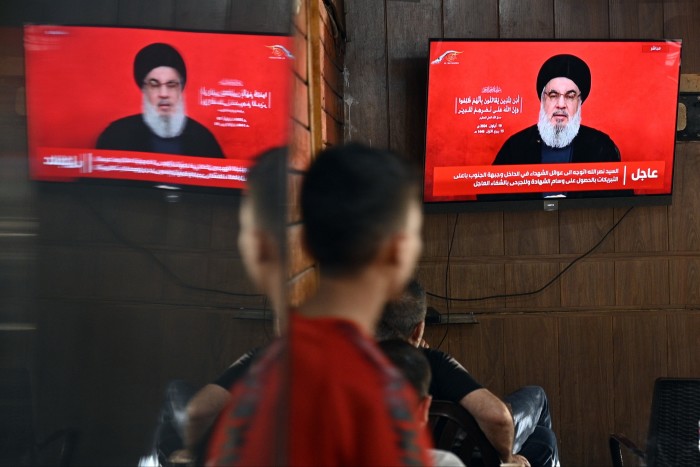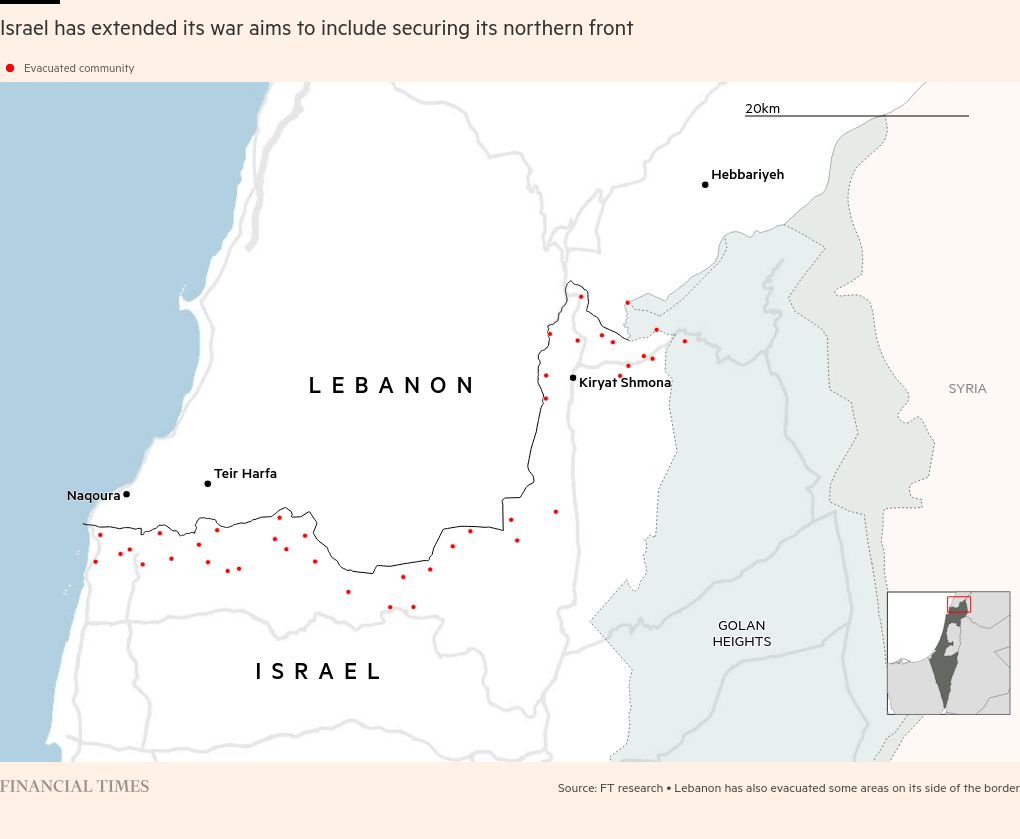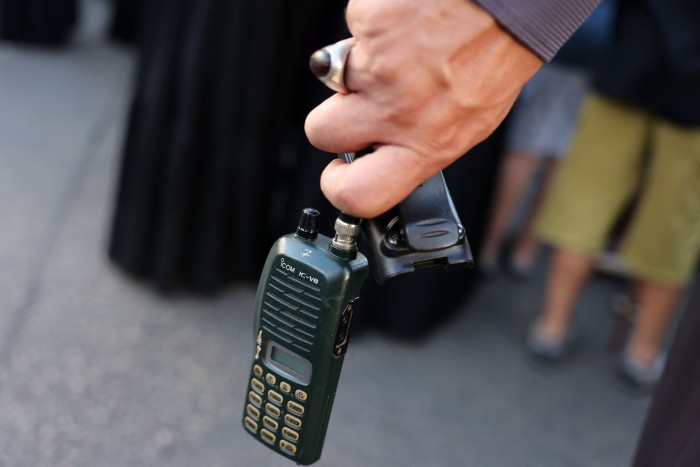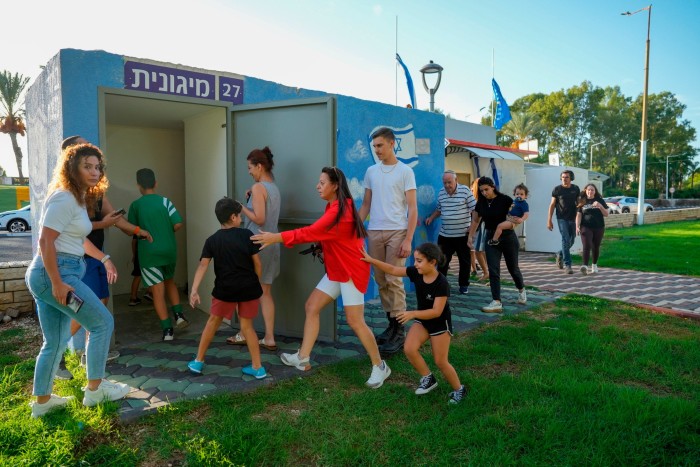
Exploding pagers and walkie-talkies tearing through Hizbollah’s ranks and paralysing its communications. Israel’s defence minister announcing a “new phase in the war” with the Lebanese militant group. Israeli air strikes along Lebanon’s southern border.
All the signs pointed to what easily could have been the opening move of a significant offensive, after which Israeli tanks would have been seen rolling into the foothills of southern Lebanon. But that has not happened. At least not yet.
So days after electronic devices began detonating in Lebanon — in an operation some western capitals see as a reckless provocation — one key question for the Middle East remains unanswered: what was the ultimate purpose of this attack?
While current and former Israeli officials differ on how the strategy might unfold, they say one important goal underlies the approach. Israel, through force, is trying to break Hizbollah leader Hassan Nasrallah’s vow to continue fighting Israel until there is a ceasefire in Gaza.
“Israel is trying to delink the Lebanon arena from Gaza and to make the price of not doing so clear to Nasrallah,” said Assaf Orion, a retired Israel general now at the Washington Institute for Near East Policy.

No Israeli minister has publicly taken responsibility for the Lebanon explosions, an intelligence operation of fearsome effectiveness, albeit one condemned by the EU’s top diplomat as aiming to “spread terror”. But Yoav Gallant, Israel’s defence minister, acknowledged on Wednesday that his forces’ “centre of gravity” was moving northward and away from Gaza.
That shift came in the face of a strategic dilemma that has loomed over Israel’s leadership for months: how to safely return the 60,000 residents displaced from their homes in northern Israel by Hizbollah rocket, missile and drone fire, which began the day after October 7.
Nasrallah, even on Thursday, pledged to continue Hizbollah’s attacks until Israel stopped fighting in Gaza. But Israeli Prime Minister Benjamin Netanyahu, under pressure from his far-right political allies, has rejected ending the war in Gaza until “total victory” is secured over Hamas.
US-mediated ceasefire talks over Gaza have meanwhile stalled amid mutual recriminations, with Hamas’s own desire for a deal also in question. Israel’s response has now been to ramp up the cost for Hizbollah of continuing its cross-border fire on Hamas’s behalf, according to a person with knowledge of the Israeli government’s thinking.
“If there’s no [Gaza ceasefire] . . . and the north [Lebanon] continues as is, you get to the conclusion that a diplomatic deal [with Hizbollah] won’t happen,” the person said. “So you’ll reach a solution via ‘violence’ — that is, a military operation.”

Israel may have ultimately authorised the pager and walkie-talkie attacks because of fears that the militant group may have been set to uncover the explosives hidden within the devices, according to two people later briefed on the operation.
But several former Israeli officials said that regardless of the trigger, the attack undoubtedly sent a strong message to Nasrallah, who Orion said has since the start of the conflict tried to juggle his two main goals of supporting Hamas while avoiding an all-out war.
“He’s managed both at a reasonable cost to himself — until now,” Orion said. “This looks less like the first stage of opening a war, and more like an escalation to force Hizbollah to stop [firing] and to raise the price for Nasrallah.”
For his part Nasrallah on Thursday vowed retribution, while acknowledging the blow Hizbollah had suffered in attacks he said had crossed “all red lines”.
“There is no doubt that we have been subjected to a major security and military blow that is unprecedented in the history of the resistance and unprecedented in the history of Lebanon,” he said.

The Israel Defense Forces are on their highest level of alert, with heavy combat divisions deployed to the north, including most recently the elite 98th Division, which had previously been scheduled to re-enter Gaza.
“I’ve already said we will return the residents of the north securely to their homes. And this is precisely what we will do,” Netanyahu said in a video clip on Wednesday.
Israeli political and military leaders have suggested in recent days that the country’s strategy could include a greater escalation of the conflict, even to the point of full-scale war. Gallant on Thursday vowed that the “sequence of military actions will continue” against Hizbollah.
Many Israeli analysts — and, according to polls, a consistent majority of the Israeli public — see full-scale war with Hizbollah as a strategic necessity with the only question being one of timing.
Yaakov Amidror, a former national security adviser to Netanyahu who now works at Washington think-tank JINSA, argued there was a “clear need” to attack Hizbollah not only because of the border crisis but to “disconnect” the group from the broader Iran-backed “ring of fire” that surrounds Israel.
“War with Hizbollah is waiting around the corner, but it’s a question of when — it could be tomorrow, in a month or two years,” he said.
But Amidror, who is still seen as close to Netanyahu, argued that several conditions should be met before Israel launched such a campaign. These included readying the IDF, preparing the home front to absorb thousands of incoming missiles and — critically — securing international legitimacy for such a move, especially from the US.
“If the conditions aren’t ripe, then the current attrition will continue. There’s no point in going to war if you’re not ready,” he added.

US President Joe Biden’s administration has repeatedly made clear, including in recent days, that it does not want to see the conflict between Israel and Hizbollah escalate, and that it strongly prefers a diplomatic solution for both crises in Gaza and on the Lebanon border.
Yet, with tensions escalating and the prospects growing of a severe Hizbollah retaliation for this week’s events, the Israeli leadership is debating what a war with the militant group should look like, according to the person familiar with current Israeli government thinking.
“In the minds of some political and security leaders, there is no alternative to a military operation,” the person said.
While some officials advocate a limited campaign focused on southern Lebanon, others favour a wider offensive. Both would require significant ground manoeuvres aimed at creating a “secure zone” inside Lebanon to enable the safe return of northern Israeli residents to their homes.
But the person familiar with Israel’s planning said the danger was that “the ‘small option’ could escalate into full-scale war anyway”. “So if that’s the case why not go all the way at the start?”
Regardless, many analysts question whether either option would actually achieve Netanyahu’s goal of “changing the security situation in the north” or only make matters worse.
Israel for almost two decades held a so-called “security zone” in southern Lebanon, taking constant casualties before it withdrew in May 2000.
“It all sounds familiar,” said Orion, the former general. “So you stay there — but you and what army?” he added, warning that the overstretched IDF was already battling on several active fronts.
Israel may be gambling that after the explosions in Lebanon this week, Hizbollah — bereft of internal communications, command and control, and fearing additional security breaches everywhere — is in no position to go to war.
Yet Israel’s apparent attacks, and the Lebanese militants’ vow of revenge further raises the chances that the conflict started in Gaza last October could engulf the entire region.
“It’s saddening,” said the person familiar with current Israeli government thinking. After all the warfare and bloodshed “it will all end with the same diplomatic agreements that are currently on the table”.
Additional reporting: Felicia Schwartz in Washington